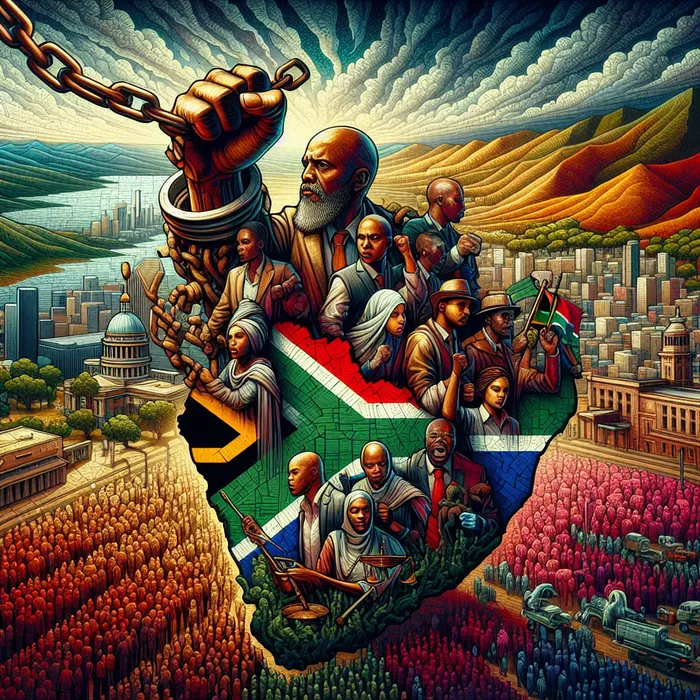Is the National Dialogue a path to unity or political farce?
Opinion

President Cyril Ramaphosa proposed a national dialogue to address South Africa’s deepening divisions. The writer says that before a national dialogue can succeed, parties must first resolve their own conflicts. Without this, any dialogue risks being inconclusive — a wasteful exercise in futility.
Image: IOL / Ron AI
“Power in organisations is the capacity generated by relationships. What gives power its charge, positive or negative, is the quality of the relationship.” — Margaret J Wheatley, A Simpler Way
AT a 2008 book launch in Addis Ababa, renowned economist George Ayittey coined the catchphrase “African solutions to African problems”, urging political leaders to abandon recycled colonial clichés that no longer serve 21st-century Africa.
In his seminal work, Africa Unchained: The Blueprint for Africa’s Future, Ayittey lamented the “so-too-must-we” syndrome, the uncritical imitation of the West: “If all they can do is imitate, they might as well bring back the foreigners to rule Africa.”
Yet, while African politicians claim ownership of the solutions they adopt, they seldom agree on what the real problems are.
Periods of intense social and political conflict present opportunities for societal transformation. These conflicts are often resolved outside formal institutions — through emergency measures, civil war, the collapse of old regimes, or renegotiated political orders via peace agreements and transitions.
Since the 1990s, negotiated settlements have reshaped social contracts worldwide. Increasingly, these processes include not just warring factions but also civil society, women’s groups, religious organisations, and other marginalised voices.
National Dialogues, highly inclusive negotiation forums, have emerged as tools for major political reform, constitutional drafting, or conflict resolution in fragmented societies.
President Cyril Ramaphosa proposed a national dialogue to address South Africa’s deepening divisions. Supporters argue it is the only way to heal political fractures and societal tensions; critics dismiss it as “dead on arrival”. This scepticism is understandable — our political parties are in disarray, embroiled in internal crises. Before a national dialogue can succeed, parties must first resolve their own conflicts. Without this, any dialogue risks being inconclusive — a wasteful exercise in futility.
A national dialogue is a democratically inclined mechanism for resolving contentious issues and fostering national consensus. Typically established via a parliamentary commission, it aims to unify a fractured nation. Yet, in South Africa, the mere proposal of such a dialogue has already sparked controversy, long before its conceptualisation.
Scholars and peacemakers view national dialogues as vital for conflict resolution. They serve as platforms for broad-based reform, whether negotiating a new social contract or addressing narrower political crises. According to Blunck et al in National Dialogue Handbook: A Guide for Practitioners, these dialogues bring together diverse stakeholders during pivotal transitions. Similarly, C Barnes notes they help establish new institutions and renegotiate the relationship between state and society.
Tragically, women — despite being key stakeholders — are often excluded from these critical discussions. Patriarchal structures, cultural barriers, and systemic inequalities silence their voices. Yet, women’s inclusion is essential. To address the root causes of conflict, dialogues must engage marginalised groups — women, youth, religious leaders, and others who have been historically sidelined.
The success of any dialogue depends on power dynamics. In South Africa, divergent interests, identities, and unequal resource access fuel disagreements. True inclusion is non-negotiable — without it, the dialogue’s legitimacy and outcomes are compromised.
Parliamentarians advocate for “broad-based, inclusive dialogue”. Yet, in a nation scarred by historical trauma, can such a process foster justice and lasting peace? Early signs are discouraging. Ambiguity surrounds the dialogue’s purpose, and deep-seated divisions persist.
Historical grievances further complicate matters. Figures revered by some are reviled by others; events celebrated by one group are mourned by another. In such a polarised climate, dialogue risks becoming an exercise in futility, a stage for performative politics rather than substantive change.
The government’s establishment of a National Dialogue Committee is a step in the right direction. However, to ensure success, it must:- Develop a clear, actionable plan — with defined objectives and timelines.- Ensure genuine inclusivity — engaging political leaders, traditional and religious figures, youth, and civil society.- Prioritise transparency — publishing guidelines and ensuring logistical preparedness.
Above all, South Africa’s elites must recognise the public’s exhaustion. Citizens crave leadership that transcends self-interest — one that speaks hard truths and offers hope.
As it stands, South Africa’s envisaged national dialogue is unlikely to resolve the current crisis. Without addressing foundational issues — particularly the land question — it risks becoming another hollow gesture.
The media must also play a role. Newspapers and journalists can foster dialogue, bridging racial divides and rebuilding trust. Perhaps a Journalism Dialogue Platform, led by the media fraternity, could lay the groundwork for broader national conversations.
Whatever form it takes, a national dialogue must happen — lest we drift further into fragmented worlds within the same nation.
* Dr Vusi Shongwe works in the Department of Sport, Arts, and Culture in KwaZulu-Natal and writes in his personal capacity.
** The views expressed here do not reflect those of the Sunday Independent, IOL, or Independent Media.